庞德与中国古诗共37页
- 格式:ppt
- 大小:7.41 MB
- 文档页数:37
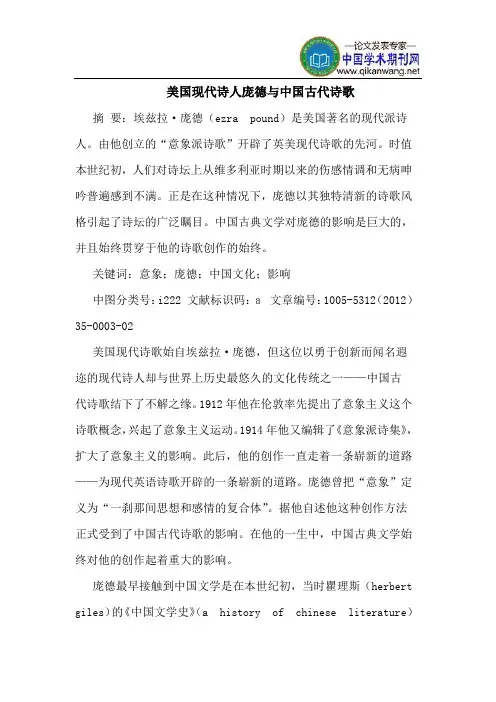
美国现代诗人庞德与中国古代诗歌摘要:埃兹拉·庞德(ezra pound)是美国著名的现代派诗人。
由他创立的“意象派诗歌”开辟了英美现代诗歌的先河。
时值本世纪初,人们对诗坛上从维多利亚时期以来的伤感情调和无病呻吟普遍感到不满。
正是在这种情况下,庞德以其独特清新的诗歌风格引起了诗坛的广泛瞩目。
中国古典文学对庞德的影响是巨大的,并且始终贯穿于他的诗歌创作的始终。
关键词:意象;庞德;中国文化;影响中图分类号:i222 文献标识码:a文章编号:1005-5312(2012)35-0003-02美国现代诗歌始自埃兹拉·庞德,但这位以勇于创新而闻名遐迩的现代诗人却与世界上历史最悠久的文化传统之一——中国古代诗歌结下了不解之缘。
1912年他在伦敦率先提出了意象主义这个诗歌概念,兴起了意象主义运动。
1914年他又编辑了《意象派诗集》,扩大了意象主义的影响。
此后,他的创作一直走着一条崭新的道路——为现代英语诗歌开辟的一条崭新的道路。
庞德曾把“意象”定义为“一刹那间思想和感情的复合体”。
据他自述他这种创作方法正式受到了中国古代诗歌的影响。
在他的一生中,中国古典文学始终对他的创作起着重大的影响。
庞德最早接触到中国文学是在本世纪初,当时瞿理斯(herbert giles)的《中国文学史》(a history of chinese literature)就引起了他很大兴趣,他对书中所录的刘彻的《落叶哀蝉曲》大为赞赏,不久就出现在他的诗集中。
对此,可以加以比较:刘彻:罗袂兮无声,玉樨兮尘生。
/虚房冷而寂寞,落叶依于重肩。
/望彼美之女兮安得,感余心之未宁。
庞德:绸裙的,瑟再不复闻,灰尘飘落在宫苑里,听不到脚步声,乱叶飞旋着,静静地堆积,她,我心中的欢乐,睡在下面。
一片潮湿的树叶粘在门槛上。
the rusting of silk is discontinued/ dust drifts over the courtyard/ there is no sound of footfall,and the leaves,/ scurry into heaps and lie still;/ and she the rejoicer of the heart is beneath’em,/ a wet leaf that clings to the thresold.庞德改作的前两句是对原文的忠实翻译。
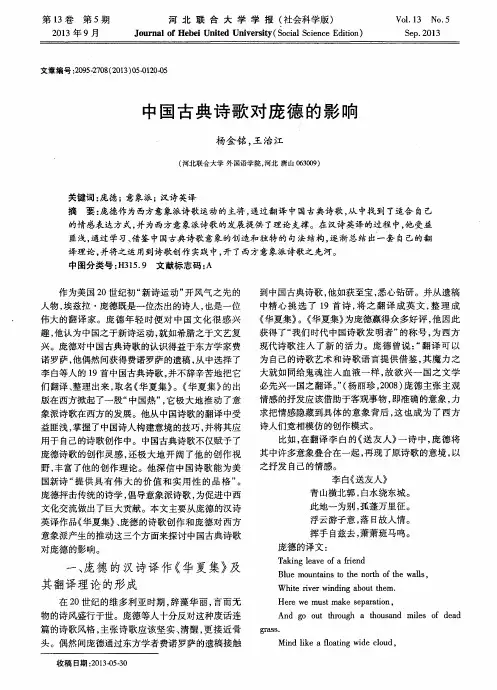

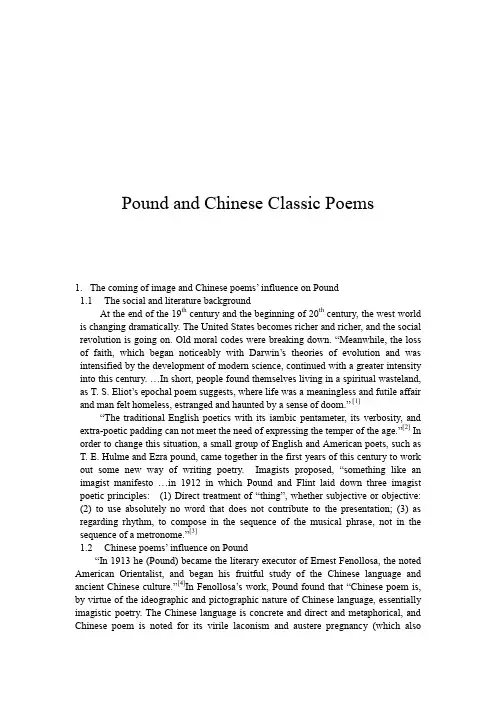
Pound and Chinese Classic Poems1.The coming of image and Chinese poems’ influence on Pound1.1The social and literature backgroundAt the end of the 19th century and the beginning of 20th century, the west world is changing dramatically. The United States becomes richer and richer, and the social revolution is going on. Old moral codes were breaking down. “Meanwhile, the loss of faith, which began noticeably with Darwin’s theories of evolution and was intensified by the development of modern science, continued with a greater intensity into this century. …In short, people found themselves living in a spiritual wasteland, as T. S. Eliot’s epochal poem suggests, where life was a meaningless and futile affair and man felt homeless, estranged and haunted by a sense of doom.” [1] “The traditional English poetics with its iambic pentameter, its verbosity, and extra-poetic padding can not meet the need of expressing the temper of the age.”[2] In order to change this situation, a small group of English and American poets, such as T. E. Hulme and Ezra pound, came together in the first years of this century to work out some new way of writing poetry. Imagists proposed, “something like an imagist manifesto …in 1912 in which Pound and Flint laid down three imagist poetic principles: (1) Direct treatment of “thing”, whether subjective or objective: (2) to use absolutely no word that does not contribute to the presentation; (3) as regarding rhythm, to compose in the sequence of the musical phrase, not in the sequence of a metronome.”[3]1.2Chinese poems’ influence on Pound“In 1913 he (Pound) became the literary executor of Ernest Fenollosa, the noted American Orientalist, and began his fruitful study of the Chinese language and ancient Chinese culture.”[4]In Fenollosa’s work, Pound found that “Chinese poem is, by virtue of the ideographic and pictographic nature of Chinese language, essentially imagistic poetry. The Chinese language is concrete and direct and metaphorical, and Chinese poem is noted for its virile laconism and austere pregnancy (which alsocharacterize imagist poetry). The history of Chinese writing conditioned Chinese literature to its conciseness and precision. To make fewer words do more was the cherished aim of literary training in ancient china. Since images need fewer connectives and convey more, it is only natural that they are built into the very texture of classical Chinese poetry. They either juxtapose with, or superimpose or melt into each other, and often form clusters of fused ideas impregnated with power and energy.”[5] It is no wonder that Ezra Pound found a “"New Greece in the culture of China", and a model to recreate,to emulate and to surpass. ·Inspired by the Classical poems Chinese Poetry,Pound found a way to break away from“the poetics of motional slither”, to mold a brand new kind of poetry,and to launch an American cultural revolution.”[6]One points should be pointed out is that some scholars over emphasized Chinese classical poems s’ influence on Pound and imagism. According to the study of Yuan Xin, the ideas of imagism of Pound has already set up before he started to study Chinese classical poems s and Chinese literature. “It is Pound’s principle of imagism that caused him to be interested in acquiring, understanding and translating Chinese classical poems s, and Chinese classical poems s enhanced his belief in imagism. ”[7] Imagist poems inherit some ideas from Chinese classical poetry, but “the imagist movement drew from a variety of poetic traditions. Greek, Provencal, and Japanese poem are among the many acknowledged sources of imagism and Pound’s poetry.”[8] It is at this point that Chinese classical poem can be compared with imagist poems.2. A comparative study of Image between Chinese classical poems s and pound’s poemsIn this section, the key idea of imagist movement—Image will be discussed to show the common ground and difference between Chinese classical poems s and pound’s poems2.1the common ground of Chinese classical poems s and pound’s poems2.1.1 the ideas about imageAs the name of the movement--Imagism shows, Image is the core of the movement. “T. E. Hulme said that the image must enable one “ to dwell and linger upon a point of excitement, to achieve the impossible and covert a point into a line.”[9] Pound defined an image as that which presents an intellectual and emotional complex in an instant of time, and later he extended this definition when he stated that an image was “a vortex or cluster of fused ideas”“endowed with energy.””[10] In Chinese classical poems s, Image also plays an important role for a very long time. The images in the Chinese classical poems express the “subtle momentary felling”and “a complex felling”[11]or “Image is pure sensatory. it is the concretion of felling.” Or “image is the impression of the things left in the mind.”[12] So it is easy to found that the west and east have something in common to some extent.2.1.2 The presentation of image.In this section, the method of presentation, like direct treatment, and superposition, used both in Chinese classical poems s and Pound’poems will be discussed.2.1.2.1 Direct treatmentThe first principle of Imagist, “with its emphasis on direct treatment, indicates a desire to make the expression resemble the “object” as closely as art can make it. By “direct,”Pound means no fuss, frill, or ornament.”[13] In his work “Osiris”, Pound explained this principle. He holds that modern poems should be “closer to the thi ng; beauty of the thing should replace rhetoric and frilled paper decoration.” The language used in the poems should be harder, nearer the bone, and like granite”. [14]That requires poets do not use ornament or emotion to decorate the thing but present the thing before the reader, just like present a sculpture before a visitor. Pound found that “Chinese poets have been content to set forth their matter without moralizing and without comment”[15] He wrote in his works: If you want some European to give a definition of something, the definition they gives will deviate from the simple thing and move to a remote place where nobody knows. If you ask him what red is, he will definite it as a kind of color. If you ask him what color is, He will tell you it is a kind of libration or refraction of light, or the separation of spectrum. While Chinese defines red in another way: “red: cherry, rust or flamingo.” That means Chinese treat things directly without any ornament.[16]2.1.2.2 Juxtaposition of imagesOne of the characteristics in classical poems Chinese poem is the juxtaposition used especially in ”jue ju"(quatrain) and”Lu shi'(eight- line verse). The following is one example: [17]月落乌啼霜满天江枫渔火对愁眠The moon goes down,Crows caw,frost takes the sky,Sleepy gloom weaves,River maples and fishing lanterns.In the original poem, the images---moon, Crows, frost, River maples, fishing lanterns---are presented one after another. All these images are juxtaposed. Pound named this kind of technique as “superposition” and he used it a lot in his writing. One does not have to search far for an apparent example of this sort in Pounds famous imagistic couplet, In a Station of the Metro which immediately shows similarity in technique to the above classical poems couplet.The apparition of these faces in the crowd;[18]Petals on a wet, black bough.The images “apparition of these faces” and “Petals on a wet, black bough” are juxtaposed too.The Superposition of images has created a special effect---cinematic montage effect. Autumn Thoughts by Ma Zhiyuan(1260-1341 A. D.) might serve to illustrate:天净沙·秋思[19]枯藤老树昏鸦,小桥流水人家,古道西风瘦马。
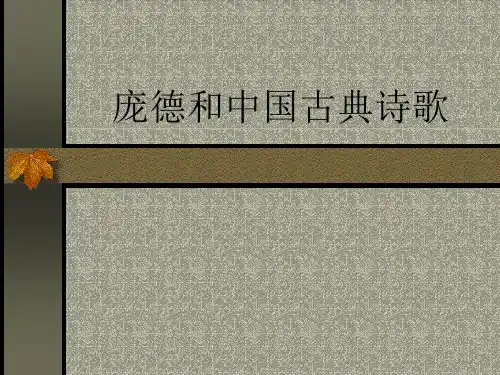
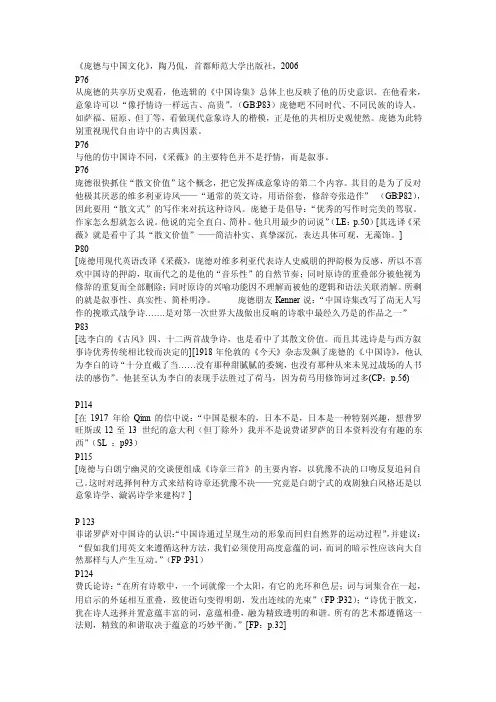
《庞德与中国文化》,陶乃侃,首都师范大学出版社,2006P76从庞德的共享历史观看,他选辑的《中国诗集》总体上也反映了他的历史意识。
在他看来,意象诗可以“像抒情诗一样远古、高贵”。
(GB:P83)庞德吧不同时代、不同民族的诗人,如萨福、屈原、但丁等,看做现代意象诗人的楷模,正是他的共相历史观使然。
庞德为此特别重视现代自由诗中的古典因素。
P76与他的仿中国诗不同,《采薇》的主要特色并不是抒情,而是叙事。
P76庞德很快抓住“散文价值”这个概念,把它发挥成意象诗的第二个内容。
其目的是为了反对他极其厌恶的维多利亚诗风——“通常的英文诗,用语俗套,修辞夸张造作”(GB:P82),因此要用“散文式”的写作来对抗这种诗风。
庞德于是倡导:“优秀的写作时完美的驾驭。
作家怎么想就怎么说。
他说的完全直白、简朴。
他只用最少的词说”(LE:p.50)[其选译《采薇》就是看中了其“散文价值”——简洁朴实、真挚深沉,表达具体可观,无藻饰。
]P80[庞德用现代英语改译《采薇》,庞德对维多利亚代表诗人史威朋的押韵极为反感,所以不喜欢中国诗的押韵,取而代之的是他的“音乐性”的自然节奏;同时原诗的重叠部分被他视为修辞的重复而全部删除;同时原诗的兴喻功能因不理解而被他的逻辑和语法关联消解。
所剩的就是叙事性、真实性、简朴明净。
庞德朋友Kenner说:“中国诗集改写了尚无人写作的挽歌式战争诗…….是对第一次世界大战做出反响的诗歌中最经久乃是的作品之一”P83[选李白的《古风》四、十二两首战争诗,也是看中了其散文价值。
而且其选诗是与西方叙事诗优秀传统相比较而决定的][1918年伦敦的《今天》杂志发飙了庞德的《.中国诗》,他认为李白的诗“十分直截了当……没有那种甜腻腻的委婉,也没有那种从来未见过战场的人书法的感伤”。
他甚至认为李白的表现手法胜过了荷马,因为荷马用修饰词过多(CP:p.56)P114[在1917 年给Qinn的信中说:“中国是根本的,日本不是,日本是一种特别兴趣,想普罗旺斯或12至13 世纪的意大利(但丁除外)我并不是说费诺罗萨的日本资料没有有趣的东西”(SL :p93)P115[庞德与白朗宁幽灵的交谈便组成《诗章三首》的主要内容,以犹豫不决的口吻反复追问自己。
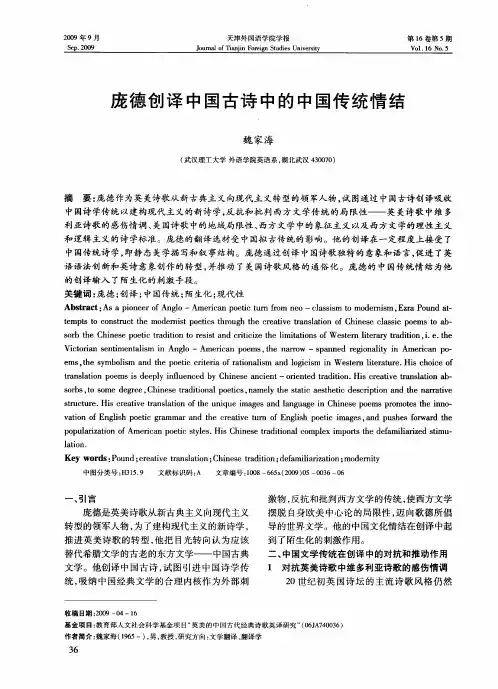
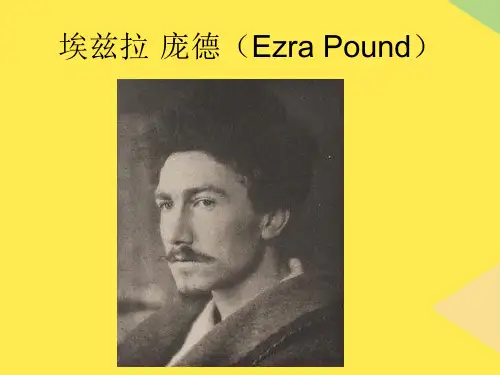
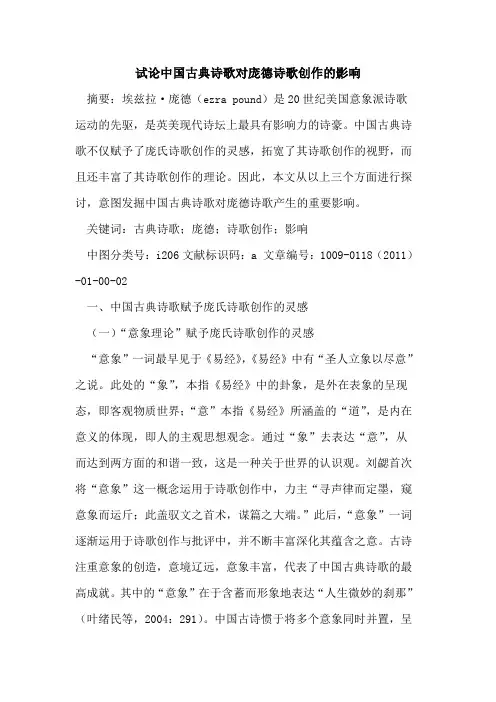
试论中国古典诗歌对庞德诗歌创作的影响摘要:埃兹拉·庞德(ezra pound)是20世纪美国意象派诗歌运动的先驱,是英美现代诗坛上最具有影响力的诗豪。
中国古典诗歌不仅赋予了庞氏诗歌创作的灵感,拓宽了其诗歌创作的视野,而且还丰富了其诗歌创作的理论。
因此,本文从以上三个方面进行探讨,意图发掘中国古典诗歌对庞德诗歌产生的重要影响。
关键词:古典诗歌;庞德;诗歌创作;影响中图分类号:i206文献标识码:a 文章编号:1009-0118(2011)-01-00-02一、中国古典诗歌赋予庞氏诗歌创作的灵感(一)“意象理论”赋予庞氏诗歌创作的灵感“意象”一词最早见于《易经》,《易经》中有“圣人立象以尽意”之说。
此处的“象”,本指《易经》中的卦象,是外在表象的呈现态,即客观物质世界;“意”本指《易经》所涵盖的“道”,是内在意义的体现,即人的主观思想观念。
通过“象”去表达“意”,从而达到两方面的和谐一致,这是一种关于世界的认识观。
刘勰首次将“意象”这一概念运用于诗歌创作中,力主“寻声律而定墨,窥意象而运斤;此盖驭文之首术,谋篇之大端。
”此后,“意象”一词逐渐运用于诗歌创作与批评中,并不断丰富深化其蕴含之意。
古诗注重意象的创造,意境辽远,意象丰富,代表了中国古典诗歌的最高成就。
其中的“意象”在于含蓄而形象地表达“人生微妙的刹那”(叶绪民等,2004:291)。
中国古诗惯于将多个意象同时并置,呈现在读者面前,颇有利用蒙太奇手法产生的效果。
如马致远的《天净沙?秋思》:“古藤老树昏鸦,小桥流水人家,古道西风瘦马。
夕阳西下,断肠人在天涯。
”作者将十二个意象并置叠加,呈现出一幅带有悲凉色彩的画面,刻画出一个在黄昏时分漂泊于西风古道上的游子形象。
庞氏诗歌创作之中大量意象的并置,就是中国古典诗歌“意象理论”赋予其诗歌创作的灵感的。
(二)中国古典诗风赋予西方意象派诗歌创作的灵感西方意象派的产生最初是对当时诗坛文风的一种反驳。
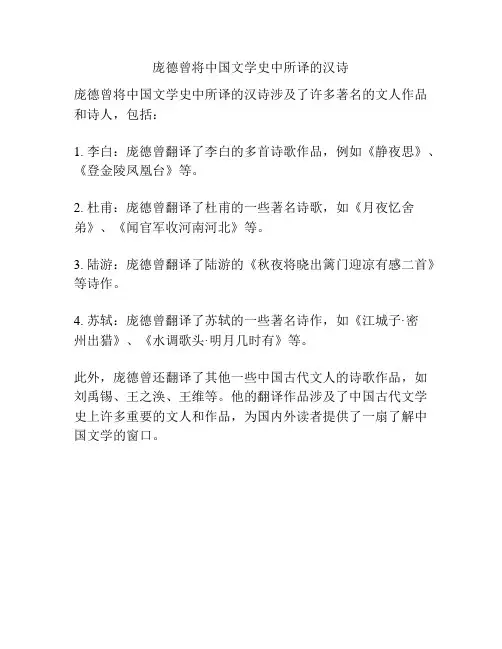
庞德曾将中国文学史中所译的汉诗
庞德曾将中国文学史中所译的汉诗涉及了许多著名的文人作品和诗人,包括:
1. 李白:庞德曾翻译了李白的多首诗歌作品,例如《静夜思》、《登金陵凤凰台》等。
2. 杜甫:庞德曾翻译了杜甫的一些著名诗歌,如《月夜忆舍弟》、《闻官军收河南河北》等。
3. 陆游:庞德曾翻译了陆游的《秋夜将晓出篱门迎凉有感二首》等诗作。
4. 苏轼:庞德曾翻译了苏轼的一些著名诗作,如《江城子·密
州出猎》、《水调歌头·明月几时有》等。
此外,庞德曾还翻译了其他一些中国古代文人的诗歌作品,如刘禹锡、王之涣、王维等。
他的翻译作品涉及了中国古代文学史上许多重要的文人和作品,为国内外读者提供了一扇了解中国文学的窗口。
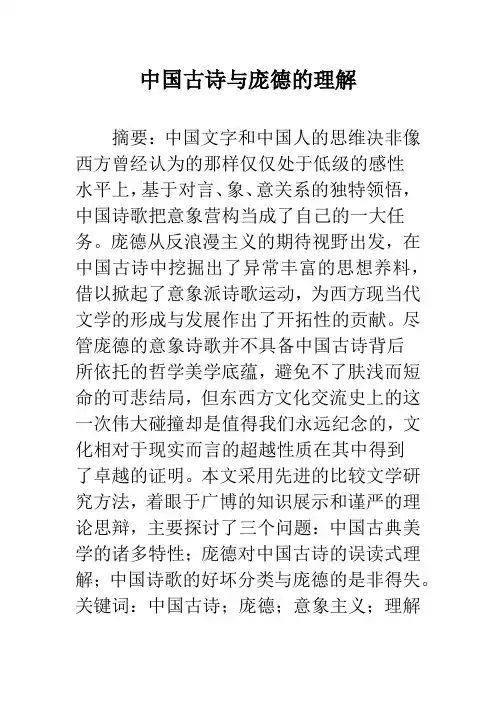
中国古诗与庞德的理解摘要:中国文字和中国人的思维决非像西方曾经认为的那样仅仅处于低级的感性水平上,基于对言、象、意关系的独特领悟,中国诗歌把意象营构当成了自己的一大任务。
庞德从反浪漫主义的期待视野出发,在中国古诗中挖掘出了异常丰富的思想养料,借以掀起了意象派诗歌运动,为西方现当代文学的形成与发展作出了开拓性的贡献。
尽管庞德的意象诗歌并不具备中国古诗背后所依托的哲学美学底蕴,避免不了肤浅而短命的可悲结局,但东西方文化交流史上的这一次伟大碰撞却是值得我们永远纪念的,文化相对于现实而言的超越性质在其中得到了卓越的证明。
本文采用先进的比较文学研究方法,着眼于广博的知识展示和谨严的理论思辩,主要探讨了三个问题:中国古典美学的诸多特性;庞德对中国古诗的误读式理解;中国诗歌的好坏分类与庞德的是非得失。
关键词:中国古诗;庞德;意象主义;理解似乎确如今道友信所言,现代东西方的艺术发展具有一种逆现象:“一方在发现着他方的过去,他方也在自律性地发现一方的过去。
”本文就是为了从理论上考察这种逆现象在意象派诗歌运动的领袖埃兹拉·庞德身上的发生过程而作的:首先,我们必须搞清楚中国古典美学的特征;其次,我们要介绍庞德对中国古诗的误读式理解;最后,我们将结合中国诗歌的地位问题分析庞德等人的得失。
一作为常识,谁都知道汉字属于表意文字。
不过尤其在西方,表意文字又经常被与象形文字混为一谈,人们因而以讹传讹地认为汉字是幅简洁的图画。
固然这二者是有一定联系的,造字六书之中即有象形;而且从起源上讲,象形大约还是汉字发展的第一个阶段。
许慎写道:“古者庖牺氏之王天下也,仰则观象于天,俯则观法于地,视鸟兽之文与地之宜,近取诸身,远取诸物,于是始作《易》八卦以垂宪象。
及神龙氏结绳为治,而统其事,庶业其繁,饰伪萌生。
黄帝之史苍颉,见鸟兽蹄迒之迹,知分理之可相别异也,初造书契。
”但事情也仅仅如此。
象形才是六书之一,许慎接下来又说:“苍颉初作书,盖依类象形,故谓之文。
《神州集》共收中国古典诗歌十九首。
其中包括《诗经·小雅。
采薇》,《汉乐府陌上桑》,《古诗十九首·青青河畔草》,郭璞的《游仙诗》,陶潜的《停云》,王维的《送元二使安西》,卢照邻的《长安古意》以及李白的《长干行》、《江上吟》、《侍从宜春苑奉诏赋龙池柳包初青听新莺百嗽歌》、《古风十八·天津》、《古风十四·胡关》、《忆旧游寄憔郡元参军》、《送友人入蜀》、《登金陵凤凰台》、《黄鹤楼送孟浩然之广陵》、《送友人》、《玉阶怨》、《古风六·代马》。
第一首《诗经·小雅·采薇》采薇采薇,薇亦作止。
曰归曰归,岁亦莫止。
靡室靡家,犹脸之故。
不逞启居,犹脸之故。
采薇采薇,薇亦柔止。
曰归曰归,心亦忧止。
忧心烈烈,载饥载渴。
我戍未定,靡使归聘。
采薇采薇,薇亦刚止。
曰归曰归,岁亦阳止。
王室靡篮,不逞启处。
忧心孔疚,我行不来。
彼尔维何,维常之华。
彼路斯何,君子之车。
戎车既驾,四牡业业。
岂敢定居,一月三捷。
驾彼四牡,四牡骇骇。
君子所依,小人所排。
四牡翼翼,象饵鱼服。
岂不日戒,犹脸孔棘。
昔我往矣,杨柳依依。
今我来思,雨雪霏霏。
行道迟迟,载渴载饥。
我心悲伤,莫知我哀。
1 SONG OF THE BOWMAN OF SHUHere we are, picking the first fern-shootsAnd saying: When shall we get back to our country?Here we are because we have the Ken-nin for our foemen,We have no comfort because of these Mongols.We grub the soft fern-shoots,When anyone says "Return," the others are full of sorrow. Sorrowful minds, sorrow is strong, we are hungry and thirsty. Our defense is not yet made sure, no one can let his friend return. We grub the old fern-stalks.We say: Will we be let to go back in October?There is no ease in royal affairs, we have no comfort.Our sorrow is bitter, but we would not return to our country. What flower has come into blossom?Whose chariot? The General's.Horses, his horses even, are tired. They were strong.We have no rest, three battles a month.By heaven, his horses are tired.The generals are on them, the soldiers are by them.The horses are well trained, the generals have ivory arrows and quivers ornamented with fish-skin.The enemy is swift, we must be careful.When we set out, the willows were drooping with spring,We come back in the snow,We go slowly, we are hungry and thirsty,Our mind is full of sorrow, who will know of our grief?by Bunno — Reputedly 1100 B.C第二首《古诗十九首·青青河畔草》《青青河边草》无名氏青青河畔草,郁郁园中柳。
跟庞德有关的古诗词
1. 《登鹿门山怀古》唐孟浩然:昔闻庞德公,采药遂不返。
2. 《高士咏·庞德公》唐吴筠:超然风尘外,自得丘壑美。
耕凿勤厥躬,耘锄课妻子。
保兹永无患,轩冕何足纪。
3. 《鹿门寺怀庞德公》明林光:翠微夜雨来僧閤,红烛深杯话隐沦。
4. 《东汉高士咏十四首·其九·庞德公》元张雨:卧龙拜床下,刘表安能屈。
照见采药踪,犹遗鹿门月。
5. 《庞德公宅诗》宋李廌:荆山云苍苍,汉水波弥弥。
山川意高澹,宜有隐君子。
德公卧鹿门,老不践州里。
洁身远忧患,岂复存愠喜。
藐然姑射人,胡为市门倚。
诸郎有凤雏,辄与卧龙起。
6. 《司马德操谓庞德公妻子作黍元直欲来》明汤显祖:庞公大隐流,世利迥莫干。
身如野鹤矫,心与浮云閒。
刺史不能致,候谒陇亩间。
夫耕妻出馌,相对尝怡颜。
富贵得几何,忧患来无端。
善哉至人训,遗子独以安。
躬耕有馀暇,支颐玩时变。
7. 《襄阳为自古要地抚遗迹吊往事有怀七人焉因各赋诗一首·其二·庞德公》明孙承恩:庞公大隐流,世利迥莫干。
身如野鹤矫,心与浮云閒。
刺史不能致,候谒陇亩间。
夫耕妻出馌,相对尝怡颜。
富贵得几何,忧患来无端。
善哉至人训,遗子独以安。
躬耕有馀暇,支颐玩时变。
人生必读之六十五——《诗章》2011-06-14 05:58:11| 分类:人生必读| 标签:庞德诗章天堂诗人社会|字号大中小订阅埃兹拉·庞德(Ezra Pound),美国著名诗人。
1885年10月30日出生于美国爱达荷州的海利镇。
在去欧洲以前,他在宾夕法尼亚大学就学,在那里攻读美国历史、古典文学、罗曼斯语言文学。
两年后,他转至哈密尔顿大学(Hamilton College)学习,1906年获硕士学位。
1898年庞德首次赴欧,以后于1902年,1906年及1908年先后共四次去欧洲。
1908年定居伦敦,以后一度成为伦敦文坛上举足轻重的人物。
埃兹拉·庞德1885年10月30日出生于美国爱达荷州的海利镇。
在去欧洲以前,他在宾夕法尼亚州立大学就学,在那里攻读美国历史、古典文学、罗曼斯语言文学。
两年后,他转至哈密尔顿大学(Hamilton College)学习,1906年获硕士学位。
1898年庞德首次赴欧,以后于1902年,1906年及1908年先后共四次去欧洲。
1908年定居伦敦,以后一度成为伦敦文坛上举足轻重的人物。
(Personae)(A Lume Spento)在意大利威尼斯自费出版。
1909年,他的诗集《人物》1908年庞德的第一部诗集《灯火熄灭之时》在伦敦出版。
1910年他的文集《罗曼斯精神》(The Spirit of Romance)出版。
文集内容主要是他的早期译作及他历年来学术研究的成果和见解。
庞德在他早期诗作中就显示出独创精神和渊博的学识,1912年他成为芝加哥小型杂志《诗歌》驻伦敦通讯员。
1914年他与多萝西·莎士比亚(Dorothy Shakespeare)结婚。
1915年庞德发表了他根据东方学者芬诺洛萨(Fenollosa)的遗稿而译成的中国古诗英译本《中国》(Cathay)及两个日本戏剧集。
在伦敦期间他发表的另外两部著作是:《向塞克斯图斯·普罗佩提乌斯致敬》(Homage to Sextus Propertivs,1919)和《休·赛尔温·毛伯利》(Hugh Selwyn Mauberley,1920)。
庞德(Ferdinand Verbiest)是17世纪比利时耶稣会传教士,也是一位著名的我国通。
他不仅对我国文学和诗词有着深厚的造诣,还因其在我国的传教活动而留下了深远的影响。
在他的影响下,不少我国古典文学名著和经典诗词被翻译传入欧洲,其中就包括了我国文学史中所译的汉诗。
我国文学史中所译的汉诗,作为我国古典文学的精髓之一,承载着丰富的文化内涵和时代的记忆。
它们通过丰富多彩的意象和深刻的思想表达,为人们展现了我国文学之美。
而庞德作为传播我国文学的使者,为西方读者带来了大量以汉诗为代表的我国文学作品,开启了东西方文学交流的新篇章。
我国文学史中所译的汉诗在庞德的传播下,为西方读者带来了对我国古典文学的全新理解。
庞德不仅致力于翻译我国古典文学作品,更深入地研究其背后的文化内涵和情感表达。
他的翻译作品不仅在语言上忠实于原作,更在意境和情感上进行了巧妙的转化,使得西方读者能够更加深入地感受到我国文学的魅力。
我国文学史中所译的汉诗在庞德的推动下,为中西文明交流搭建起了桥梁。
由于庞德在我国的传教活动,他深入了解了我国文学的瑰丽之处,不仅在欧洲传播了很多我国古典文学作品,也在我国推广了西方的文学作品,推动了中西文明的交流与互鉴。
这种跨文化的交流,不仅促进了文学艺术的传播,更丰富了世界文学的多元性和包容性。
再次,我国文学史中所译的汉诗在庞德的传颂下,为世界文学的发展贡献了东方的智慧。
我国古典文学作品以其深刻的思想和博大精深的艺术表达,成为了世界文学发展的瑰宝。
在庞德的推动下,这些我国文学作品得以在西方广泛传播,不仅丰富了西方文学的内涵,更为西方文学注入了东方的智慧和魅力。
庞德在传播我国文学史中所译的汉诗方面所做出的贡献不可忽视。
通过他的努力和影响,我国古典文学作品得以传播至欧洲,为中西文明的交流与互鉴搭建了桥梁,也为世界文学的发展带来了东方的智慧。
希望庞德这样的传播者能够得到更多的关注和尊重,以推动世界文学的多元发展和共同繁荣。
浅析庞德对中国古诗翻译中的创造性叛逆摘要:翻译在比较文学中有其存在的独特价值,特别是文学翻译中的创造性叛逆,有很大的研究价值。
20世纪美国著名诗人和理论家埃兹拉·庞德,他对中国古诗和典籍进行了大量的翻译介绍,曾在欧美掀起了一场引进和学习东方文学的运动。
他的诗学翻译,诗学理论,对当时英美诗歌的发展产生了深远的影响。
庞德对中国古诗进行了大量翻译,那么作为一个译者,从比较文学的角度来看,其中必定包含了庞德作为译者的创造性叛逆。
当然创造性叛逆具体又表现在多个方面。
论文将从创造性叛逆的个性化翻译,误译两个方面入手,从译介学角度出发,进行比较研究。
关键词:译介学庞德创造性叛逆个性化翻译误译一个译者的创造性叛逆表现在多个方面,首先很重要的一点就是“个性化翻译”,其实从字面意思上就可以理解为译者在翻译作品时要有自己的个性和原则,在翻译中有其特有的追求目标。
庞德在翻译中就很有自己的见解方法和坚持原则。
庞德独特的译学思想体现在多个方面。
首先,庞德十分反对将原著视为绝对权威,他反对一个字一个字的翻译,认为那样会使原作丧失生机。
他认为翻译是一种阐释,也是一种尝试,翻译者将通过自己对原作的阐释和尝试将会再次创造出新诗歌。
从另一方面也可看出,庞德认为翻译不应该过分强调直译,重要的是要关注文本意义,再现文本蕴含的感情。
他认为如果仅仅局限在文本的字面意思上,这样不利于文本意义的表达,最终会破坏整首诗的意境和美感。
所以庞德在翻译中国古诗时会把握诗中他所谓的“无法毁坏”的东西。
更简略地说,这个“无法毁坏”的东西就是我们古诗中的精神实质。
正因如此,庞德很多译诗中不完全忠于原作,尤其是在词句上的不同。
例如《诗经·小雅·采薇》中的最末一节“昔我往矣,杨柳依依。
今我来思,雨雪霏霏。
行道迟迟,载渴载饥。
我心伤悲,莫知我哀!”庞德是这样翻译的:When we set out,/ the willows were drooping with spring./ we come back in the snow,/ we go slowly,we are hungry and thirsty,/ our mind is full of sorrow who will know of our grift?这是庞德在《神州集》中的汉译英诗歌。